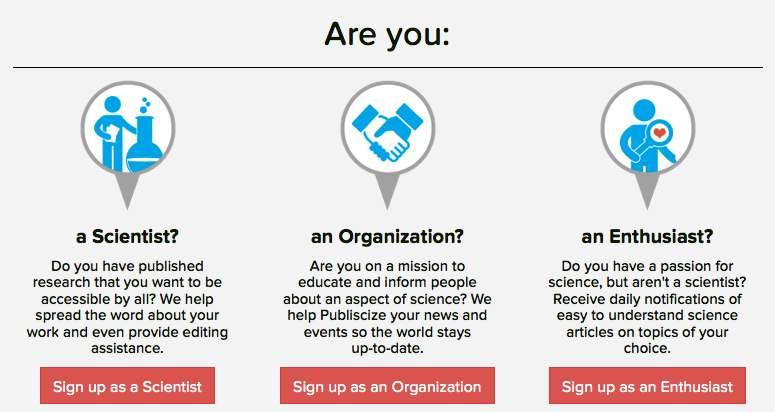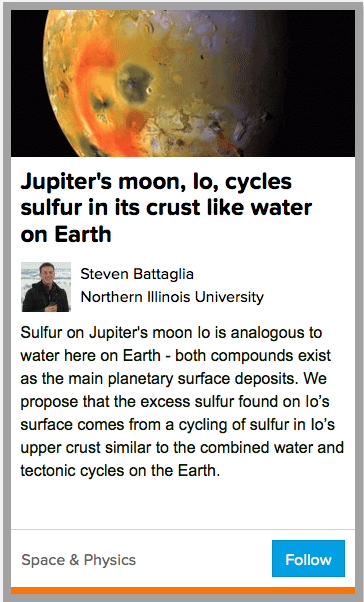 Friends and readers of astrobites often send us recommendations for other science outreach websites and organizations. Recently, several different people pointed us towards Publiscize, a website where scientists can write short, easy-to-read summaries of their research for the public to read. I’ve checked out Publiscize and interviewed its founder, Rob Seigel, and have decided to pass that recommendation on to you.
Friends and readers of astrobites often send us recommendations for other science outreach websites and organizations. Recently, several different people pointed us towards Publiscize, a website where scientists can write short, easy-to-read summaries of their research for the public to read. I’ve checked out Publiscize and interviewed its founder, Rob Seigel, and have decided to pass that recommendation on to you.
Rob Seigel received his Ph.D. in Atmospheric Physics from Colorado State University a couple of years ago. During his first postdoc, at the University of Miami, Rob began to be bothered by the limitaions of public outreach. “We scientists do such great research,” he told me, “But very little of this knowledge makes it to the public.” He estimates that the public only hears about ~1% of the research done by scientists. In his spare time during his postdoc research, Rob decided to make a tool to give scientists and researchers the ability to disseminate their results directly to the public.
Publiscize serves three different groups: scientists, organizations, and the public. Scientists are the main content providers: they can write a 300-400 word summary (called a “Scinopsis”) for any of their own published journal articles. If you register as a scientist, you have to wait until Publiscize verifies that you have published to a scientific journal. It took less than a day for my credentials to be validated. The website walks you through the process of creating a Scinopsis, which is particularly helpful for scientists who may not be used to communicating their results to the public. Each Scinopsis is reviewed by Rob or a member of his Publiscize staff to make sure it’s readable and written at an appropriate level. Scientists can also mark others’ posted Scinopses as “approved” or “rejected,” based on whether they consider the post to be about credible, peer-reviewed science. A Scinopsis with more than seven approvals is labeled with a little checkmark for readers to see, but a post with too many rejections is flagged for review and possible removal by the Publiscize staff.
Organizations, such as labs or universities, can also register with Publiscize. This allows them to post news and recent results, also written at a public level. Unlike a Scinopsis from a scientist, an organization’s post does not have to be based on peer-reviewed work. I asked Rob whether he worried that organizations’ posts would be biased, and he pointed out that every submission is reviewed by Publiscize before going public, and that all organization posts are labelled, to help readers see which posts are based on peer-reviewed research.
Finally, readers can register as “Enthusiasts,” and receive daily email notifications on posts for their favorite topics. You can also read any of the posts on Publiscize without registering. Publiscize covers a wide range of scientific topics, from “People & Society” to “Wellness & Medicine” to “Earth & Climate.” Astrobites readers might be particularly interested in the “Space & Physics” section, although at the time of this writing, only three posts were listed under this topic.
I asked Rob about the lack of physics and astronomy topics, and he heaved a sigh. “It’s been more difficult than I anticipated,” he said. It turns out that the biggest challenge for Publiscize has been encouraging participation by scientists. Rob sees a lot of benefit for scientists in publishing Scinopses on Publiscize: advertising their research directly to the public, gaining visibility, encouraging cross-field collaboration. As a scientist himself, he understands how busy researchers can be, so he’s designed the website to make it as quick and easy as possible to write a Scinopsis. But getting the word out to scientists in many different fields remains a challenge. He’s had more success in some fields than in others; “Ecology & Environment” has over thirty posts, while “Chemistry & Materials” has only seven.
Astrobites and Publiscize share a lot of the same goals, particularly in making published scientific research more accessible. Here at astrobites, we (volunteer grad students) choose recently-published papers that we think are interesting or important to summarize. Publiscize, on the other hand, gives authors the opportunity to write mini-sciencebites about their own work. Personally, I find Publiscize to be a very exciting project, and I think it could be an especially useful tool for scientists looking to advertise their research and improve their writing. As any astrobites author can tell you, writing a summary of a complex article is one of the best ways to understand the work. Rob related the story of one researcher who, in the process of writing a Scinopsis for his latest paper, discovered a better way to frame his research questions, and immediately rewrote a major grant proposal he had been working on.
I recommend that you check out Publiscize and see what you think. The website is slick and attractive, and registration is easy! If you have published research, try your hand at writing a Scinopsis — it’ll be something to show your non-scientist friends and family when they ask what you’re working on, and it could help improve your writing skills. If you like what Publiscize is doing, mention it to your colleagues, advisers, and students. Let’s see if we can’t grow that “Space & Physics” section a little!


